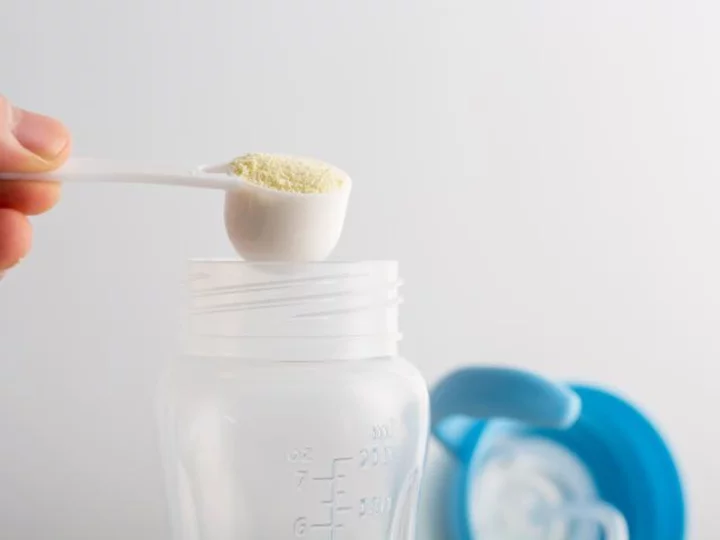US health officials may soon ask states to notify them of any cases of infants with serious infections caused by Cronobacter sakazakii, bacteria that can contaminate infant formula.
Cronobacter infections typically strike infants who are less than 2 months old, and they can be fatal or permanently disabling.
In an outbreak that the US Centers for Disease Control and Prevention investigated last year, four babies were sickened, including two who died. All the infants had been fed baby formula manufactured at the same factory in Sturgis, Michigan, triggering an extensive investigation by the US Food and Drug Administration and ultimately stopping production at the facility for months. The shutdown worsened ongoing supply chain issues and threw the country into a nationwide shortage.
Ultimately, the FDA and the CDC could find no genetic links between Cronobacter samples from the facility and the bacteria found in the water and powder used to mix the formula that the infants had consumed.
These infections are thought to be infrequent, but the true burden in the US is unknown because Cronobacter is not currently part of the National Notifiable Diseases Surveillance System, a list of about 120 illnesses given special priority by the CDC because they've been deemed to be important to public health.
The Council of State and Territorial Epidemiologists, a nonprofit organization that advocates for effective disease surveillance, identified Cronobacter as a priority area for investigation this year.
A work group was formed in the winter to assess conditions, risks and surveillance processes related to the bacterial infection, and it will present recommendations to advance Cronobacter surveillance in June.
Adding Cronobacter infections to the national watchlist is among the strategies being considered.
"When we look back at large-scale outbreaks over the course of the last year, many of those outbreaks were associated with diseases and conditions that were nationally notifiable, but not all of them," said Janet Hamilton, executive director of the council -- and Cronobacter was one of the exceptions.
"So whenever we have something like that, that prompts the council to determine and assess whether we need to potentially be doing more."
Adding an illness to the national list can have a sizable impact. After E. coli O157 was added to the notifiable disease list in 1994 and most states required doctors to report cases by 2000, the number of reported outbreaks tripled.
However, it would take quite some time for any changes to take effect.
If the Council of State and Territorial Epidemiologists votes in favor of adding Cronobacter infections to the national list of notifiable diseases, the recommendation will go to the CDC for approval. If the CDC deems an illness to be notifiable, it's up to state and local governments to adjust their reporting laws and develop processes for doctors to report cases to health departments, which then forward those reports to the CDC.
The soonest that data collection could start is the beginning of 2024, and it would most likely be well into the year, depending on state legislative sessions.
Currently, only two states, Minnesota and Michigan, require doctors to report Cronobacter cases, which may be diagnosed more generically as sepsis or meningitis, conditions that can result from an infection.
"Unless detailed studies are done, the diagnosis as a Cronobacter illness may be missed," FDA Commissioner Dr. Robert Califf wrote in a blog post last week. "The lack of mandatory reporting significantly hampers the ability to fully understand Cronobacter's public health impact."
'A necessary step'
Dr. Peter Lurie, executive director of the Center for Science in the Public Interest, applauded the potential move.
"I think it's a necessary step. It is difficult to prevent diseases that you can't count," Lurie said.
In addition, Lurie says, manufacturers should be required to notify the FDA when a batch of baby formula tests positive for Cronobacter before it leaves the plant. The FDA has asked manufacturers to tell it about positive tests, but such reporting is voluntary.
Lurie says the FDA should also be doing more sampling and testing for Cronobacter in the environment to get a better understanding of where the bacteria can turn up.
"I think we have a lot to learn there," he said.
Mitzi Baum, CEO of the group Stop Foodborne Illness, which has been advocating for the change, said she was grateful the Council of State and Territorial Epidemiologists was moving toward a vote on it.
She said greater awareness of the infection was long overdue.
"It's always prefaced by 'this is rare,' but we don't know how rare it is because it's not reportable. And there needs to be a lot more education about this pathogen and a lot more research," Baum said.
Baum said her group is working with the council to create an education campaign to raise awareness of the infection among doctors. The next step, she says, is getting funding.
The council's Hamilton points out that "simply making something nationally notifiable doesn't necessarily translate into awareness and recognition on the prevention side. If people don't have the right set of information and education, by the time we're doing public health surveillance for it, the disease or infection has already occurred."
According to the FDA, Cronobacter sakazakii is a common natural pathogen that can enter homes and other spaces on hands, shoes and other contaminated surfaces. It is "especially good at surviving in dry foods," such as powdered baby formula.
Infections are harmless for most people, but it can be life-threatening for infants, especially those who are born prematurely or with weakened immune systems. It's particularly important to be sure that parents of high-risk infants know how to keep them safe, Hamilton said.
"Providing good education around how to stop infections is really what leads to the level of change that we would love to see," she said.

